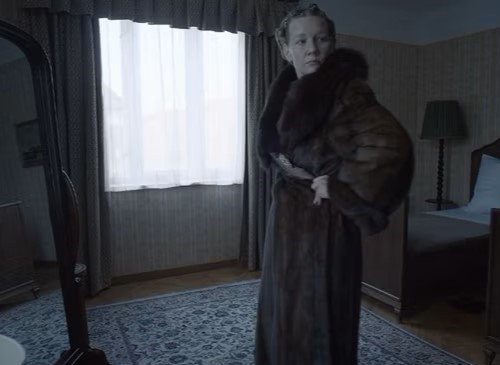The Zone of Interest delivers gripping and powerful narrative
‘The Zone of Interest’ delivers gripping narrative
Review: The historical drama focuses on the Höss family who carry out their mundane lives of privilege next door to the Auschwitz concentration camp.

In the chilling narrative of The Zone of Interest, director Jonathan Glazer pulls viewers into the unsettling world of the Höss family, whose seemingly ordinary life unfolds just a stone’s throw away from the Auschwitz Concentration Camp. This historical drama delivers a gripping narrative of the dark corners of privilege and disconnection.
The A24 film is named after the German word Interessengebiet, or “area of interest,” the name Nazis designated the area surrounding the death camp. The movie is loosely based on the novel of the same name by Martin Amis.
The film follows the domestic lives of Auschwitz commander Rudolf Höss (Christian Friedel), his wife Hedwig (Sandra Hüller) and their five children, who lived about 50 yards from the death camp. In a similar vein to The Boy in the Stripped Pajamas, the creators of the film intentionally focus on those behind the genocide, rather than the victims. In The Zone of Interest, the camera never enters the camp. Rather, viewers are immersed in the sounds of horror that emit from the wall.
The location of the family home isn’t revealed until the camera’s vantage point pans from the family in the backyard to the front gate, which shares a driveway with the heavily armed entrance to the Auschwitz Concentration Camp.
The movie was filmed in a historically accurate villa, located in Southern Poland, in the same neighborhood as the original Höss home. The standing chimneys of Auschwitz were in view of the filming location. According to Glazer, the proximity of the camp to the filming location was crucial. “There’s no fantasy staging going on. You’re looking at how they lived,” he said.
A few scenes into the film, Hedwig, who nicknamed herself “the Queen of Auschwitz,” admires herself in a mirror in her bedroom sporting a luxurious fur coat while thunderous gunshots erupt in the background. She doesn’t finch. The only characters that seem to notice are the pet dog and the youngest child who simultaneously whine throughout the film.

The coat, along with additional clothing for the children, makeup and jewelry, are enjoyed by the family, after being confiscated from the camp prisoners. The family spends a great deal of time enjoying the pool and the garden in the backyard, filled with sunflowers and other colored floras.
The juxtaposition of the children’s laughs and the serene garden to the ominous camp wall, shouts from guards and rumbles from the crematoria, evoke an eerie feeling throughout the film.
The family frequently welcomes visitors, including Hedwig’s mother, who seems uncomfortable with the proximity of the camp. During her visit, she relaxes on a lawn chair in the garden but suddenly erupts in a coughing fit. After realizing she is choking on fumes from the nearby crematoria, she flocks back into the home. Regardless, she compliments her daughter and expresses how proud she is of the life she has built.
Later, the viewer is introduced to her bedroom. The dark, cold room is glowing red. After struggling to sleep, she gets up to peer out the window at the fire, ash and smoke emitting from the crematoriums – serving as a reminder that they were operating at all times. Hedwig’s mother leaves unannounced before morning.
However, she doesn’t deviate from her position of privilege. This became apparent when she pondered if her former boss was imprisoned in the camp, noting her dismay over losing a bidding war for her curtains at auction.
One of the most memorable parts of the film, to me, was the score, directed by composer Mica Levi. The beginning and the ending of the film include a total 10-minute run of black screen time, filled with a mix of bleak voices and frequencies Levi described as “a kind of modern distortion.” The audience is left in the dark without video to reflect and digest the film. Similar tense music is included over scenes of Rudolf reading bedtime stories to his children.
Levi was awarded the 2023 Los Angeles Film Critics Association Award for Best Music for his score in The Zone of Interest.
Although the film is heavy, there is one note of hope. There are several scenes, filmed through the lens of thermal-heat infrared cameras, of a young girl who hides apples and other food scraps on the outskirts of the camp in work fields. The character is based on a woman named Alexandria who worked for the Polish Resistance when she was just 12 years old. The remodeled house in which the movie was filmed was her childhood home.
“That small act of resistance, the simple, almost holy act of leaving food is crucial because it’s the one point of light,” Glazer told the Guardian. “It felt impossible to just show the utter darkness, so I was looking for the light somewhere and I found it in her.”
Some viewers have noted how the themes of the film mirror the ongoing Israel War on Gaza. The Israel offensive has killed more than 27,000 people since Hamas launched an attack on Israel on Oct. 7, 2023, according to Gaza’s Health Ministry. One social media user said the movie represented “modern-day Israel,” drawing parallels to the walls of Auschwitz in the film to the iron wall barrier that divides the Gaza Strip from Israel.
“I was determined to make it not about then, but about now, because this movie isn’t a document,” Glazer said in an interview with Rolling Stone. “It’s not a history lesson. It’s a warning.”
While the cameras don’t enter the camp walls, the film concludes by taking viewers inside the present-day Auschwitz Birkenau Museum and Memorial, offering a powerful moment of reflection as employees clean the space.
I watched the film in a small theater. When the movie concluded, the audience remained still as the credits rolled in silence. No one got up from their seat until the credits were well over.
By focusing on the Höss family, the film highlights how those in positions of privilege go about their normal lives, disconnected from reality and the horrors they perpetuate. While the film excludes the voices of the victims of the Holocaust, The Zone of Interest proves an intense story about power relations.
